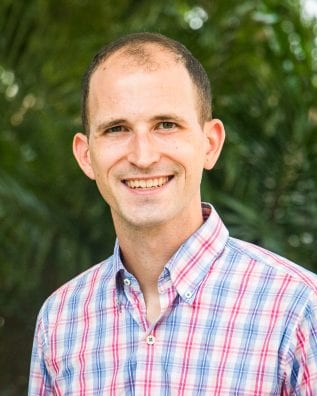Physicist Selected for $750,000 Early Career Energy Grant

UCF physics Assistant Professor Michael Chini is one of 84 scientists across the nation selected today for a Department of Energy grant through the Office of Science Early Career Research Program.
Chini, who has been an assistant professor at UCF since 2015 and earned his doctorate here in 2012, will receive $150,000 each year for the next five years to conduct research in the area of atomic, molecular and optical physics, which holds the promise of providing new ways to generate energy.
The highly competitive DOE awards are designed to bolster the nation’s scientific workforce by providing support to exceptional researchers during the early career years, when many scientists do their most formative work.
To be eligible, a researcher must be an untenured, tenure-track assistant or associate professor at a U.S. academic institution or a full-time employee at a DOE national laboratory, who received a doctorate within the past 10 years. Awardees were selected from a large pool of university- and national laboratory-based applicants. Selection was based on peer review by outside scientific experts, according to the DOE.
Chini was one of 54 university awardees nationwide and three in Florida.
“Supporting talented researchers early in their career is key to building and maintaining a skilled and effective scientific workforce for the nation. By investing in the next generation of scientific researchers, we are supporting lifelong discovery science to fuel the nation’s innovation system,” said Secretary of Energy Rick Perry. “We are proud of the accomplishments these young scientists have already made, and look forward to following their achievements in years to come.”
Chini’s area of expertise is ultrafast and strong-field laser interactions with solids, attosecond physics and coherent control. His research is also supported by the Air Force Office of Scientific Research, which recognized him with a Young Investigator Program grant worth almost $500,000 in 2016.
The research Chini will conduct for the DOE focuses on using lasers to study and control chemical reactions that create or store energy. In principle, lasers can be used to induce chemical reactions by tuning the laser frequency to match vibrational frequencies of specific bonds, and depositing a large amount of optical power into a molecule. This way, bonds can be selectively formed or broken. However, the technique generally fails because energy naturally redistributes quickly within molecules. Ultrashort-pulsed femtosecond lasers provide a way to deposit the required energy before the molecule has a chance to react, and potentially a way to steer the chemical-reaction outcomes but that, too, poses challenges.
Chini’s work aims to track and control time-dependent electronic and vibrational motion in molecules exposed to very intense laser fields, such as those used to instigate molecular reactions. The research will provide new insight into the mechanisms behind strong-field laser-control techniques, and will help reveal the optimal conditions for laser-driven reactions.
The research is in a new area for Chini’s lab, which previously focused on attosecond dynamics in solid-state materials. But the topic is very familiar to Chini, whose doctorate research at Kansas State University and in the Institute for the Frontiers of Attosecond Science and Technology at UCF focused on attosecond dynamics in gas-phase atoms and molecules.
“I’m excited to get started. I hope my work will help advance our knowledge to develop new techniques for harnessing energy, something we all need every day,” Chini said.
It has been a good year for the Chinis.
Chini’s wife, Jacquelyn, is an assistant physics professor at UCF. Her work focuses on enhancing physics education and earlier this year the National Science Foundation named her one of its early career grant recipients.
College of Sciences Dean Michael Johnson said he is fortunate to have such dedicated and talented faculty throughout the college.
“They truly are a dynamic duo,” Johnson said. “The work they are doing – in quite different areas of physics – is changing the world. I am grateful that we were able to attract two scientists of such high caliber to UCF.”
Final details of the awards announced today are subject to grant and contract negotiations between DOE and the awardees.
